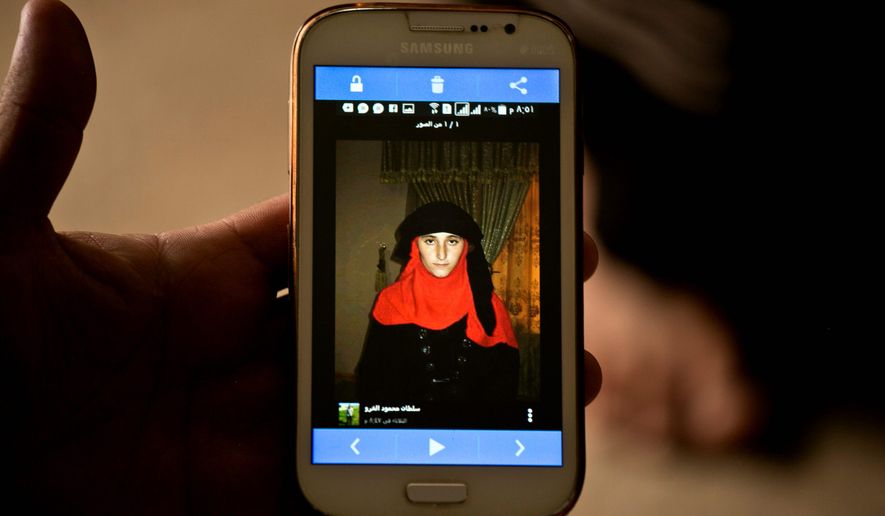Many in the international community agree the Islamic State has carried out war crimes in northern Iraq, but human rights activists say bureaucratic bungling by the Iraqi central government has delayed the prospect of international criminal trials against the terror group’s captured operatives.
While recent weeks saw Baghdad get behind a push to draft a U.N. Security Council Resolution to formalize an international war crimes probe, the development came after months of foot-dragging — during which more than 1,000 Islamic State detainees were swept through local courts in northern Iraq for hearings on whether they should face trials in the Iraqi capital or simply be released.
It’s a situation that drew sharp criticism from activists and some former U.S. officials, who say the U.N. Security Council, and even The Hague-based International Criminal Court (ICC) should have a far more prominent role in whatever charges ultimately get pursued against the terror group also known as ISIS and ISIL.
“An international investigation would further the cause of justice wherever that justice is eventually delivered — whether in Baghdad, Irbil or in any court in the world having jurisdiction over alleged perpetrators,” says Ambassador-at-Large for War Crimes Issues under former President Barack Obama Stephen J. Rapp.
Mr. Rapp told The Washington Times that prosecuting Islamic State operatives for specific heinous actions, as opposed to just charging them in local Iraqi courts with supporting a religious fanatical cause, would help destroy the group’s recruiting capabilities.
Former Secretary of State John F. Kerry officially declared in March of last year that Islamic State had carried out “genocide” against Christians and other religious and ethnic minority groups under its control, including Yazidis and Shiite Muslims.
Prisons in the northern Iraqi city of Qaraqosh are currently holding suspected Islamic State fighters and collaborators captured in the recent battle for Mosul. Interrogated by Iraqi intelligence officials, the detainees are brought before a local judge who determines if they should be tried for terrorism or let go.
It’s a fast-track process that rights activists say ignores the magnitude of Islamic State’s crimes and neither holds the group’s ideology accountable in the international arena nor provides a mechanism to arrest and prosecute fighters who have fled Iraq.
“[We are] talking with governments and it’s always — every time we’re hearing, ’terrorism — we can get them immediately behind bars.’ Yes, you can get them behind bars, but I think war crimes, rather than terrorism crimes, are very different, and we have to all realize that,” says Pari Ibrahim, the founder and executive director of the Free Yazidi Foundation.
“What we’ve seen — not only in the U.S. but also in Europe — we are lacking to hold perpetrators accountable for war crimes,” Ms. Ibrahim said during a recent panel discussion in Washington, D.C. “This is, for me as a Yazidi, very frustrating because we have the laws in place but we — we choose the easy way out, and that is indictment for terrorism.”
Suspected Islamic State fighters captured in Iraq can be accused of violating Iraq’s own terrorism law. But an estimated 30,000 fighters came from countries around the world to join the organization, including approximately 5,000 Europeans, some of whom are believed to have escaped by returning home or seeking asylum by pretending to be refugees.
U.K. diplomats more than a year ago began drafting a resolution to have the U.N. Security Council compel the ICC to begin formally pursuing Islamic State for war crimes, crimes against humanity and genocide. The catch is that Iraq’s central government, a key player in delivering Islamic State suspects to the international realm, has spent much of the past year squabbling over whether to throw its weight behind the resolution.
Iraqi Foreign Minister Ibrahim al-Jafari made the first step to joining the draft resolution on Aug. 9, sending a letter to the U.N. formally asking for assistance in documenting Islamic State war crimes and holding members of the group accountable in accordance with Iraqi law.
It remains to be seen whether the letter will accelerate the resolution process or bog it down further. U.N. watchers say Baghdad still appears hesitant about allowing the kind of deep international involvement in domestic affairs that could be triggered by the resolution. It could, hypothetically, be used to pursue war crimes charges against Iraqi officials or militias.
Concerns are seen as highest over the prospect of charges against the Iran-backed Shiite militias, who were approved by Iraq’s parliament as a legitimate fighting force against Islamic State. Some groups accuse the militias of war crimes against Sunni Muslims in Iraq.
To counter Baghdad’s fears, specific language in the British draft of the U.N. resolution says only Islamic State fighters would be the focus of a war crimes probe.
Some Yazidis say the recent letter sent to the U.N. by Iraq’s foreign minister was a hopeful sign. “I am grateful to Iraqi Prime Minister Mr. Abadi and to the United Kingdom for initiating the first step to establish an international mechanism to investigate ISIS and hold them accountable,” said Nadia Murad, a Yazidi survivor of Islamic State and representative of the Yazda foundation, a group working to prosecute Islamic State members. “Victims deserve a meaningful accountability mechanism in which they trust, and I hope that the Security Council resolution will reflect that.”
• Laura Kelly can be reached at lkelly@washingtontimes.com.




Please read our comment policy before commenting.